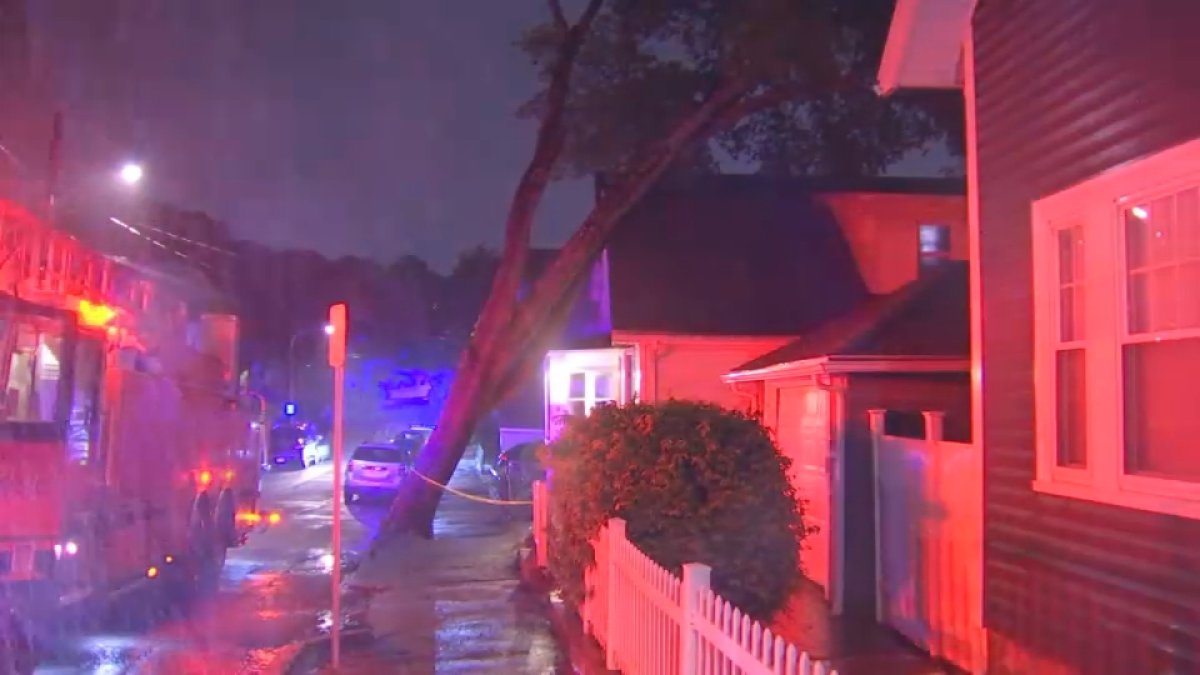Massachusetts
Randolph club can reopen after temporary closure, licensing board rules

A popular Randolph, Massachusetts, club will be allowed to reopen after being temporarily shut down amid safety concerns and violations.
A letter to the owner of the Mojitos Country Club sent by the town’s licensing board lays out a chronology from July 2022 through this summer that prompted the hearing. The business holds a license for food and alcohol as well as live entertainment.
Town documents show there have been complaints of overcrowding, and people were seen repeatedly walking into the parking lot with open containers.
After a violent attack at the club, police say officers were never called. A shooting outside the club on July 4, 2022, left 29-year-old Jovani Delossantos dead.
On Wednesday, the licensing department held a hearing, voting to give Mojitos a five-day suspension of operations before being allowed to reopen next week.
Police and the licensing board will continue to monitor the club to ensure the safety of patrons and Randolph residents.
Owner Ricky Peña said he’s grateful for the decision, which allows the club to continue to create space in the community.
“We’re looking forward to the opportunity to bring back what we do best for our community you know, to celebrate who we are, our traditions our culture and have a place where people of color and Latin people can go to and feel safe,” Peña said.
Police said after the shooting last year, they began reviewing safety concerns at the club, and over the next year, they recorded further issues.
Among those issues include an apparently oversold show on May 27, 2023, which led to a call for police to assist with a man who was trying to force his way into the club, despite being told it was over capacity. Police said the man, and a crowd of patrons, were “disorderly” and “assaultive,” one group calling out “let him go, let’s beat up the cop,” as an officer tried to make an arrest. Afterward, police learned that the man was frustrated because he had pre-purchased tickets to an event at the club, but was turned away due to capacity issues at the door.
On June 29, 2023, police learned of an event being advertised at the club that did not have the appropriate permits. It was ultimately canceled.
And on July 9, 2023, police say they responded to the club when they saw patrons parking on the opposite side of the street and crossing over. The officer at the time noted that it looked like the club was over capacity. The officer reported that as an event ended, people streamed out into the parking lot, some still with alcoholic drinks in their hand and others smoking marijuana. Other officers were called in to help clear the area.
“This incident required Sgt. Morgan to redirect resources from their assigned sectors for a prolonged period of time, thus impacting the safety of the entire community,” the report reads.
The report also noted that it was difficult to find Mojitos security staff to help with the process.
Police also noted a video of an incident on July 16, 2023, which appears to show a group of women fighting in the main parking lot, with club customers and staff as onlookers. Officials say police were never called to respond to the situation, either during or after the violence.
“Each of the aforementioned incidents is very concerning,” the closing summary of the police history notes. “It appears that a pattern has developed at this establishment where basic safety expectations are not being met. Some of these issues appear to be related to a communication disconnect between Mojitos Country Club Management and outside promoters who are failing to appropriately monitor ticket sales as it related to building capacity.”
Lack of a clear security and safety plan was also a concern.

Massachusetts
At the WBUR Festival, exploring the good and bad scenarios for Massachusetts’ future

On Friday morning, I had the opportunity to help kick off the inaugural WBUR Festival in Boston with a panel on “The Future of Innovation in Massachusetts.”
My panelists: Katie Rae from Engine Ventures, an MIT-affiliated venture capital firm; Julie Kim, president of the U.S. Business Unit at Takeda Pharmaceuticals, now the largest biopharma employer in Massachusetts; and Avak Kahvejian, a general partner at Flagship Pioneering, an incubator of new companies in Cambridge.
The group laid out some reasons for optimism about the future of innovation in our state, and also some reasons for concern. All three of them are parents, so I also asked what advice they would give to other parents who have children in school today about the job market.
Reasons for optimism
Rae made the case that federal research funding cuts may paradoxically stimulate innovation by pushing academic researchers to create startups and commercialize their work on a faster time frame. In the short term, “we might get more companies because of this moment than fewer,” she said. She cited Commonwealth Fusion Systems as a prime example — it emerged from an MIT lab that had lost its funding several years ago.
“They invented the company,” she said, instead of letting the science die on the vine.
- Read more: MassLive’s 12 innovation leaders to watch in 2025
“It’s not that I’m not upset about what’s happening,” Rae said, “but I do think really good things are going to come out of it.”
But over the long term, she acknowledged, “we’re going to get fewer [companies] because there’s less [federal research] funding.”
Kahvejian made the case that, while national and global pressures exist, Massachusetts remains extraordinarily well-equipped to generate breakthrough innovations. Flagship Pioneering, where he is a general partner, raised a $3.6 billion fund last year — its largest ever — to invent and launch new biotech companies.
Kahvejian noted the state has shown resilience in the past: Many big names of the 20th century, such as Polaroid and Lotus Development Corp., have vanished, but new companies have emerged and grown.
Rae offered hope that even in a divided Washington, supporting technology development in areas like advanced chips and energy production has bipartisan support.
“No matter what party you’re in, you’re going to want to fund the things that are fundamental to long-term economic prosperity and security,” she said.
Rae said she was encouraged to see Harvard University standing up to pressure from the Trump administration, despite efforts to block the school’s enrollment of international students and to eliminate essentially all federal funding of research there. Of Harvard President Alan Garber, she said: “He’s doing all those things and actually gaining a lot of support, right? He got a standing ovation at Harvard [graduation] yesterday.”
Is there a way for Harvard to emerge victorious in the tangle with Trump and various federal agencies like the Department of Homeland Security? “I think Harvard is winning in a lot of ways,” Rae said. “They’re winning in different court battles. And I think long-term, they will prevail. There’s great research there. It’s an institution that the U.S. should be proud of, and is proud of, and produces so many of our great leaders …”
Reasons for concern
Kim sounded the alarm about China’s scientific momentum.
“There are now 30% of the original publications [in the journal Science] coming from Chinese labs. The U.S. is now at 30%. The number is declining for the U.S., and it’s increasing for China, so … it’s no longer a copycat [economy.] There’s innovation coming from that country,” she said.
Kahvejian pointed to investor hesitation caused by the U.S. Food and Drug Administration’s inconsistency, and volatile stock markets. With regards to the FDA drug approval process, he said that some biotech companies are reporting delays and “strange responses” — but that’s not universal.
Kim and Kahvejian both expressed concern about a broader societal drift away from believing in science and supporting scientific research.
Kahvejian said that echo chambers, Artificial Intelligence (AI), and misinformation are amplifying anti-science sentiment. “We need to talk about how this stuff works. We need to make it accessible to people,” he said, calling for better science education and public engagement.
Rae echoed that point, warning that resentment of elites and academia is feeding distrust and division.
And Kahvejian warned that the federal government’s wavering stance on vaccines is damaging long-term public health preparedness and also investment in that industry sector.
“We’ve gone back the other way, almost worse than we were before [COVID], where vaccines are seen as a bad thing,” he said.
Advice about the future job market
Kim emphasized that the rapid pace of change makes it impossible to prescribe a single career path. Instead, she advises her own children to lead with intrinsic motivation: “Pursue your passions,” she said. In her view, the key is not locking into one trajectory, but embracing a mindset of continuous learning and flexibility.
In a world where entire industries can emerge or transform within 18 months, passion can be a compass — guiding students to stay engaged and resilient as the landscape around them changes.
Kahvejian took that one step further, recommending that students follow not just their passion, but their curiosity, especially across disciplinary boundaries.
“Pursue your curiosity almost more than necessarily your passion,” he advised, warning against rigid academic silos. A student who majors in chemistry but ignores developments in AI or statistics risks becoming obsolete, he said. “You will be pigeonholed, and you will end up marginalized.”
Rae argued that foundational technical skills are as vital as ever.
“Don’t be afraid of hard sciences. It is so fundamental to the future,” she said, referring to subjects like physics, biology and chemistry. All three of her children, she said, studied chemical engineering.
At the same time, she encouraged students to embrace AI as a partner, not a threat: “AI is your friend.” She also highlighted the importance of forming relationships with other curious, driven people.
“Cultivate friendships. Cultivate other curious people,” she said.
Kim underscored that opportunity doesn’t always require a four-year degree. She highlighted work with the Massachusetts Life Sciences Center to create “alternate pathways” into biotech and related fields for students pursuing vocational routes.
“There are a lot of things you can do in manufacturing, as well as on the administrative side — marketing, sales, etc.,” she said.
Massachusetts
54 pounds of marijuana found in Massachusetts woman’s luggage at Pittsburgh International Airport

A Massachusetts woman was caught with more than 50 pounds of marijuana in her luggage at Pittsburgh International Airport, U.S. Customs and Border Protection announced on Friday.
While inspecting passenger baggage being loaded onto a London-bound flight on Saturday, officers said they found several vacuum-sealed packages of marijuana inside two suitcases. Officers learned the luggage belonged to 30-year-old Jetta Monet Corbett of Brockton, Massachusetts, who was detained at the departure gate.
$240,000 worth of UK-bound marijuana
During a secondary examination, Customs and Border Protection said officers found a total of 49 vacuum-sealed packages of a substance that field tested positive for marijuana.
Authorities said the marijuana weighed over 54 pounds and had a street value of about $240,000. Depending on how strong the drug was, Customs and Border Protection said the shipment could have fetched two to three times more if Corbett had made it to Europe.
(Photo: U.S. Customs and Border Protection)
Customs and Border Protection turned the marijuana and Corbett over to the Allegheny County police, who arrested her. She’s charged with one felony count of possession with intent to deliver a controlled substance and one misdemeanor count of possession of a controlled substance.
Criminals are using flights to move weed, CBP says
Bulk marijuana seizures at Pittsburgh International Airport are rare, but Customs and Border Protection said officers have been seeing a trend of “transnational criminal organizations” trying to move marijuana through passenger baggage and express air delivery to Europe and Africa, where it can generate huge profits.
“Anyone considering making a quick buck by carrying bulk marijuana loads for drug trafficking organizations should realize that the consequences you face can be severe when Customs and Border Protection officers catch you,” said James Hindes, Customs and Border Protection’s acting port director for the Port of Pittsburgh.
“One way that law enforcement agencies can combat transnational criminal organizations is to hit them hard in the wallet, so CBP will continue to seize these marijuana loads when we encounter them and deprive criminals of this illicit revenue.”
Massachusetts
This Massachusetts Town is Among Best Summer Travel Destinations

There are several reasons why New England is such a popular destination for vacationers and tourists alike during the Summer. And with all the great aesthetics, and of course, an overwhelming wealth of history, Massachusetts is at the heart of all those potential Summer travel destinations. And it’s not just the big cities within the Bay State. There are definitely some small towns that have a certain appeal that give off that perfect Summer vibe. In fact, we now know where you can find one of the best Summer travel destinations in the U.S., right here in Massachusetts.
The popular publication known as, ‘USA Today’ revealed its list of its 10 Best Summer travel destinations. While this Massachusetts spot didn’t necessarily make the top 10, it was a runner-up, which still puts it among the top Summer travel destinations in the country. With that, you may have guessed that it’s towards the east coast in the Bay State. That particular town is Nantucket.
Here’s what ‘USA Today’s 10 Best had to say about Nantucket being one of the best Summer travel destinations in America:
In Nantucket, Massachusetts, summer provides a memorable escape for visitors who can enjoy pristine beaches, historic lighthouses, and charming cobblestone streets lined with boutique shops and eateries. The island also hosts several notable summer events, such as the Nantucket Film Festival, celebrating screenwriting and storytelling, and The Happy Place Wellness Symposium.
It seems like it’s definitely the type of go-to destination no matter what season we’re in. That’s just one more destination to head to for your next road trip, especially during the Summer. Enjoy, Massachusetts!
10 MA Towns That Don’t Sound Like They’re in Massachusetts
Gallery Credit: Google Maps
19 Massachusetts Towns That End In ‘ham’
Gallery Credit: Google Maps
-

 News1 week ago
News1 week agoRead the Full ‘Make America Healthy Again’ Report
-

 Technology1 week ago
Technology1 week agoNow you can watch the Internet Archive preserve documents in real time
-

 Technology1 week ago
Technology1 week agoDiscord might use AI to help you catch up on conversations
-

 News1 week ago
News1 week agoVideo: Trump Repeats False Claims to South African President
-

 Science1 week ago
Science1 week agoTrump Has Cut Science Funding to Its Lowest Level in Decades
-

 World1 week ago
World1 week agoNeo-Nazi cult leader extradited to US for plot to kill Jewish children
-
Movie Reviews1 week ago
Movie Review: 'Pee-wee as Himself' unmasks Paul Reubens
-

 Movie Reviews1 week ago
Movie Reviews1 week agoMovie review: 'Dogma' re-release highlights thoughtful script – UPI.com




















